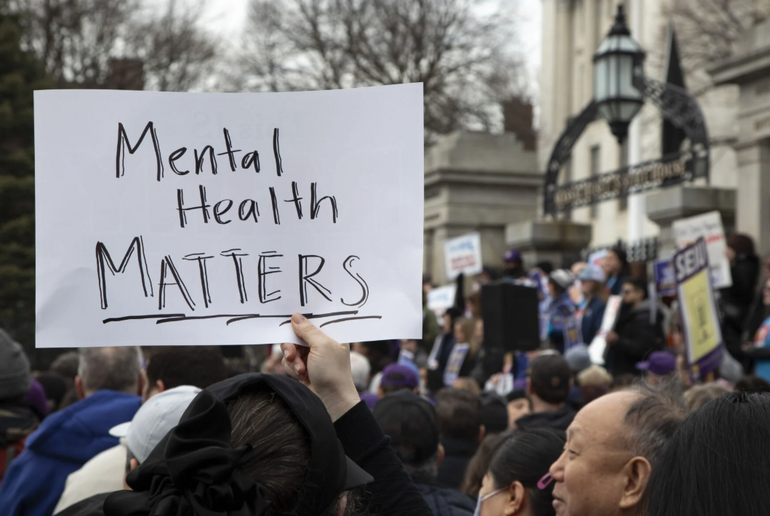As human service workers called for her removal Monday and held up posters decrying proposed budget cuts, Department of Mental Health Commissioner Brooke Doyle defended plans to lay off case managers in an effort to redirect resources to inpatient services.
Doyle, during a budget hearing in Attleboro, explained how DMH was prioritizing inpatient care while also making tough budget-balancing decisions to cut 170 out of 340 case managers. The Healey administration has also paused a controversial plan to shutter a psychiatric hospital on Cape Cod.
DMH operates 700 beds, plus 120 beds through Section 35 commitments, Doyle said. People are seeking care earlier as part of their treatment plan and are staying longer, including patients who are transferred from Bridgewater State Hospital and need to undergo a competency evaluation, she said.
“So all of our beds, literally 100% of them, are occupied. And that level of care is actually over-occupancy, and has been for almost two years now,” Doyle said.
Calling those DMH beds a priority, Doyle said officials must “think about how to make sure we’re advancing the operation of these units, covering the full cost of operation, (and) maintaining our safe, effective treatments that we’re offering there.”
About 20 SEIU Local 509 members attended the hearing at Attleboro High School, the union said. Their posters amped up their criticism of Doyle and the case manager layoffs, which are expected to save the state $12.4 million.
The union announced earlier Monday that 83% of its members from DMH took a vote of “no confidence” in Doyle over issues such as “the mismanagement of services, lack of transparency, and failure to effectively address the needs of both employees and clients.”
A DMH chapter leader at the union has warned the proposed layoffs will cause thousands of Bay Staters to lose services. Case managers don’t provide clinical care, but they perform suicide screenings and coordinate treatment plans for clients, including helping them receive their medications.
The union on Monday also shared a letter sent to Gov. Maura Healey requesting that Doyle step down or be removed from her post “immediately.”
“As employees of the DMH we have no confidence in her or her ability to lead this agency. Moreover, we believe that Commissioner Doyle has damaged both the quality of services as well as the reputation of DMH,” the letter says. “This view is one shared by many community allies and mental health community advocates alike.”
A spokesperson for the Executive Office of Health and Human Services told the News Monday the Healey administration “has the utmost confidence in Commissioner Doyle.”
“Our administration has broken down barriers to mental health access and made unprecedented investments in improving mental health services in this state – including a record $1.2 billion in DMH’s budget this year alone,” the HHS spokesperson Caroline Whitehouse said. “At a time when Donald Trump is trying to divide us and is gutting mental health funding across the country, it’s essential that Massachusetts stands together. We can have respectful discussions about the budget without resorting to personal attacks against a commissioner who has dedicated her career to improving the mental health of all.”
HHS argued Doyle has led DMH through “difficult times,” including the COVID-19 pandemic. HHS noted Doyle added 75 beds for men at Taunton State Hospital’s Recovery from Addictions program, helped design and implement the Behavioral Health Help Line that’s fielded 75,000 calls since it launched in 2023, and oversees the “largest volume of inpatient psychiatric treatment beds in the Commonwealth.”
At the hearing, Doyle emphasized that DMH is looking to reduce, but not eliminate, case management services. She said DMH will continue running 27 site offices throughout the state, and that the layoffs will not affect site directors and case management supervisors.
“With the 50% case manager reduction, we believe that we can effectively continue to deliver case management by restructuring. And in that restructure, we would be able to do a little bit more with flexible approaches than in using the existing approach today, which pairs a person with a person,” Doyle said. “And so by moving the approach to a more flexible, open-access model, as Secretary Walsh said, it would actually allow us to be less bound by authorization requirements, by the way in which sometimes people wait for assignments or they’re waitlisted.”
Under the new model, Doyle said DMH would keep track of people who have tendencies to isolate or disengage from care. The department is also embracing an approach called “critical needs case management.”
“We operate critical needs case management today. What we would envision is doing more of that approach, and scaling down that more extended or standard approach that we use today,” Doyle said. “That’s not to say that there aren’t some people who may need that, and so we would still be able to provide that on a case-by-case basis.”
Rep. Rodney Elliott, a Lowell Democrat, said the state is “moving in the wrong direction” by slashing case managers. He asked Doyle whether DMH plans to expand private sector contracts to cover services currently provided by state workers.
“No, there will be no expansion contracts,” the commissioner responded. “We will be maximizing existing resources.”
SEIU Local 509 President Dave Foley voiced disappointment after Doyle’s testimony, saying members had hoped to hear about the commissioner’s plan to serve residents relying on case management.
“We did not hear any plan,” Foley said in a statement. “Commissioner Doyle continues to demonstrate a lack of understanding of the scale and scope of case management services and the deep need for them in our communities. We hope that legislators are hearing what our workers are hearing and understand the impact: a drastic reduction in services without a plan for clients will ultimately end up harming some of the most vulnerable residents across the Commonwealth.”
The exchanges in Attleboro came a week before House Democrats plan to release their redraft of Healey’s budget, including possible alternative approaches to mental health care and workforce needs.

